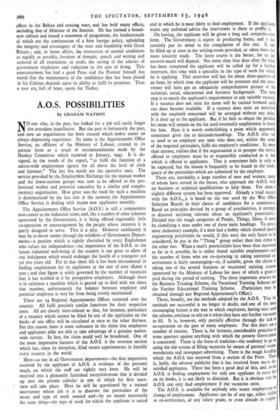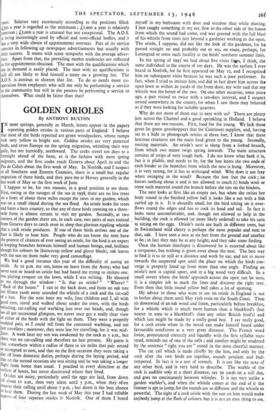A.O.S. POSSIBILITIES
By GRAHAM WATSON
NO one who, in the past, has looked for a job will easily forget the attendant humiliation. But the past is fortunately the past, and now an organisation has been created which makes easier an always depressing experience. Its name is the Appointmerfts Office Service, an offshoot of the Ministry of Labour, created in its present form as a result of recommendations made by the Hankey Committee which reported in January, 1945. It is de- signed, in the words of the report, " to fulfil the function of a nation-wide employment agency for all above the level of clerk and foreman." The last five words are the operative ones. The service provided by the Employirknt Exchange for the manual worker and the lower-income groups was now to be offered to the pro- fessional worker and potential executive by a similar and comple- mentary organisation. How great was the need for such a machine is demonstrated by the fact that at the moment the Appointments Office Service is dealing with to,000 new applicants monthly.
The Appointments Office Service (A.O.S.) is still a comparative new-corner to the industrial scene, and, like a number of other schemes sponsored by the Government, it is being offered regrettably little co-operation or encouragement by the people whose interests it is partly designed to serve. This is a pity. HoWever satisfactory it may be to throw stones through the windows of Government Depart- ments—a pastime which is rightly cherished by every Englishman who values his independence—the importance of the A.O.S. to the future industrial well-being of the country is too great to allow of any indulgence which would endanger the health of a youngster not yet two years old. For in that short life it has been instrumental in finding employment for its applicants at the rate of over 28,000 a year ; and that figure is solely governed by the number of vacancies that it has notified to it by prospective employers. Although there is in existence a machine which is geared up to deal with ten times that number, unfortunately the balance between employer and potential employee is very far from being evenly maintained.
There are 14 Regional Appointments Offices scattered over the country. All fulfil precisely similar functions for their respective areas. All are closely inter-related so that, for instance, particulars of a vacancy which cannot be filled by any of the applicants on the books of one office will be circulated at once to the other thirteen. For this reason there is some substance in the claim that employers and applicants alike are able to take advantage of a genuine nation- wide service. In fact, the claim could well be broadened. One of the more impressive features of the A.O.S. is the overseas section which has, since its inception, filled vacant appointments in literally every country in the world.
Here—as not in all Government departments—the first impression received by the applicant of A.O.S. is evidence of the personal touch, on which the staff are rightly very keen. He will be received into a pleasantly furnished receptionroom that is divided up into the private cubicles in one of which his first inter- view will take place. Here he will be questioned by a trained interviewer whose job it is to discover the particulars of the terms and type of work wanted and—by no means necessarily the same thing—the type of work for which the applicant is suited
and in which he is most likely to find employment. If the applicant wants any technical advice the interviewer is there to proffer it.
On leaving, the applicant will be given a long and comprehensive form. The Government is expert in producing forms, and it has certainly put its mind to the compilation of this one. It can be filled up at once in the writing-room provided, or taken home for more leisurely study. The latter course is the better, for on the
answers much will depend. Not more than four days after the form
has been completed the applicant will be called up for a further interview, this time with a specialist in the type of work for which
he is applying. This interview will last for about three-quarters of
an hour, by which time the applicant will be prostrate and the inter- viewer will have got an adequately comprehensive picture of his
technical, social, educational and business background. The next
step is to match the applicant's requirements to any suitable vacancy. If a vacancy does not exist his name will be carried forward until
one does become available. If a vacancy does exist an interview
with the employer concerned will be arranged without arty delay. It is then up to the applicant. But if he fails to obtain the position his name will remain on the list until eventually emplOyment is found for him. Here it is worth embellishing a point which apparently sometimes gives rise to misunderstandings. The A.O.S. tries not to send to an employer any man who does not, within the scope of the required particulars, fulfil the employer's conditions. It, more than anyone, realises that if the organisation is to prosper the service offered to employers must be as responsibly conducted as is that which is offered to applicants. That it sometimes fails is only to be expected, but the reason is frequently to be found in the inade- quacy of the particulars which are submitted by the employer.
There are, inevitably, a large number of men and women, many of whom have served in the forces, who approach the A.O.S. with no business or technical qualifications to help them. For them a slightly different system has been approved. Already a tried success with the is based on the one used by the War Office
Selection Boards in their choice of candidates for a commission.
Based on principles devised by a group of psychiatrists, it attempts to discover anything relevant about an applicant's potentialitir.
Divided into the rough categories of People, Things, Ideas, it starts by classifying a man under one of these main headings. To give a most elementary example, if a man had a hobby which showed special engineering proclivities he would, if this were the only factor to be considered, be put in the " Thing " group rather than into either of the other two. When a man's potentialities have been thus narrowed
as far as is possible, he is either found suitable employment—and
the number of firms who are co-operating in taking untrained ex. servicemen is fairly encouraging—or, if suitable, given the choice of taking one of the several business or vocational training courses sponsored by the Ministry of Labour for most of which a grant is paid during the period of training. The three important courses are the Business Training Scheme, the Vocational Training Scheme and the Further Educational Training Scheme. (Particulars may be obtained through any Regional Appointment's Office.) Those, broadly, are the methods adopted by the A.O.S. That the methods are successful is no longer in doubt, and one of the most encouraging factors is the way in which employers, having once used the scheme, continue to rely on it when they have any further vacancies to fill. It is, however, only partially effective through the lack of co-operation on the part of many employers. For this there are a number of reasons. There is, for instance, considerable prejudice an some quarters against anything with which the present Government is concerned. There is the force of tradition—the tendency to go on using the old system of filling vacancies by means of personal recom- mendations and newspaper advertising. There is the rough handling
which the A.O.S. has received from a section of the Press. There
is, lastly, the adverse publicity that it has received from many dis. satisfied applicants. There has been a good deal of this, and, as the A.O.S. is finding employment for only one applicant in every five on its books, it is not likely to diminish, But it is obvious that else A.O.S. can only find employment if the vacancies exist.
The A.O.S. is available for anybody who wants • employment or change of employment. Applicants can be of any age, either civilian or ex-servicemen, of any salary grade, or even already in employ
/Dent. Salaries vary enormously according to the positions filled. £350 a year is regarded as the minimum ; £I,000 a year is relatively common; £5,000 a year is unusual but not exceptional. The A.O.S. is being increasingly used by official and semi-official bodies, and it has a very wide choice of appointments overseas. Part of its service consists in following up newspaper advertisements but usually with little success. It meets with scant sympathy with the average adver- tiser. Apart from that, the prevailing market tendencies are reflected in the appoinudents obtained. The man with the qualifications which are in demand is easily placed. The man with no qualifications is still all too likely to find himself a name on a growing list. The A.O.S. is anxious to shorten that list. To do so needs more co- operation from employers who will not only be performing a service to the community but will in the process be performing a service to themselves. What could be fairer than that?



























 Previous page
Previous page